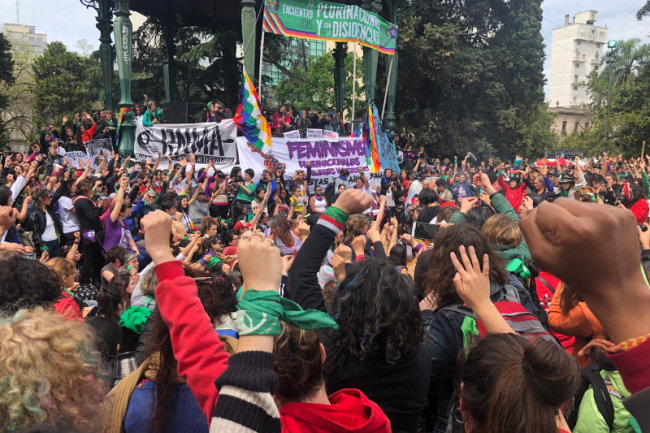
This piece appeared in the Fall 2024 issue of NACLA's quarterly print magazine, the NACLA Report. Subscribe in print today!
Leer este artículo en español.
The 34th National Women’s Encuentro held in La Plata, Argentina in October 2019 was historic for multiple reasons. For one, it brought together 200,000 feminists, sexual dissidents, and social movement activists across Abya Yala (the Americas), a landmark both in terms of size and international participation. During the early years of the Encuentros, first held in 1986, the average number of participants huddled around 1,000. Attendance grew throughout the 1990s, and with the 2001 protests known as the Argentinazo, participation jumped to an estimated 10,000 to 15,000, leading to the 2005 launch of the National Campaign for Legal, Safe, and Free Abortion.
In the 2010s, Encuentro attendance ranged from 30,000 to 70,000, but in 2019, participation skyrocketed. The showing marked the success of the Argentine feminist movement, from the #NiUnaMenos campaign against femicides to the “green tide” for abortion rights. The central debate consuming the Encuentro was whether to change its name to the Plurinational Encuentro of Women, Lesbians, Trans, Travesti, Bisexual, and Nonbinary People. Opponents argued that “women” was inclusive enough, while antiracist and sexual dissidents put forward the #SomosPluri campaign, highlighting a history of exclusion.
After more than a decade of debates about plurinationalism within the Encuentro, Feministas del Abya Yala, a transnational feminist network, became key proponents in rallying for the name change. During the 2019 Encuentro, they organized a large assembly in La Plata’s Plaza San Martín with the participation of international feminist and social movement speakers. This intervention proved essential, as several of their speakers, including the Maya K’iche’ community leader Lolita Chávez Ixcaquic and the Argentine travesti activist Alma Fernández, led the moments of the Encuentro’s closing rally when the name change was approved through acclamation.
The Encuentro’s momentum and the political significance of Feministas del Abya Yala were cut short due to the outbreak of the Covid-19 pandemic just months after the 2019 gathering. To assess where things stand since then, we interviewed three core organizers who have continued their work through the pandemic and in the face of repressive governments in their respective countries.
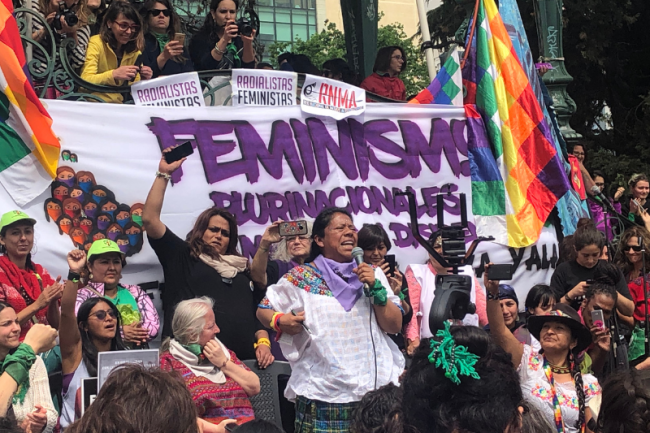
Claudia Korol, who participated in organizing the 2019 assembly, is an Argentine popular educator, feminist writer, and member of Pañuelos en Rebeldía and Feministas del Abya Yala. Adriana Guzmán Arroyo, an Aymara feminist and lesbian activist based in Bolivia, is active in Feminismo Comunitario Antipatriarcal in Bolivia and Feministas del Abya Yala. And Lolita Chávez Ixcaquic is a Maya K’iche’ leader from Iximulew (Guatemala), spokesperson for the K’iche’ Peoples Council for the Defense of Life, Mother Nature, Land, and Territory (CPK), and a member of Feministas del Abya Yala. In June, after seven years of living in exile due to threats and criminalization, Chávez returned to her community, accompanied by Korol, Guzmán, and other members of Feministas del Abya Yala.
We spoke with Korol, Guzmán, and Chávez on July 9, 2024, via Zoom. In this interview, they discuss the political experiences and debates that led to their participation in Feministas del Abya Yala, the role of the Encuentros in that development, and the challenges ahead. Our conversation has been translated from Spanish and edited for length and clarity.
Nayla Luz Vacarezza: Claudia, tell us about the Feministas del Abya Yala Assembly. What is it and how did it come about?
Claudia Korol: The assembly is an initiative that has been carried out annually for about 15 years in different ways in the context of the Encuentros in Argentina. Before, it was called the National Women’s Encuentro, but now it is the Plurinational Encuentro of Women, Lesbians, Travesti, Trans, Bisexual, and Nonbinary People. The name and modality of this political gathering were changed to reflect the diversity of the peoples and nations that are part of our territories, as well as the diversity of bodies and gender expressions.
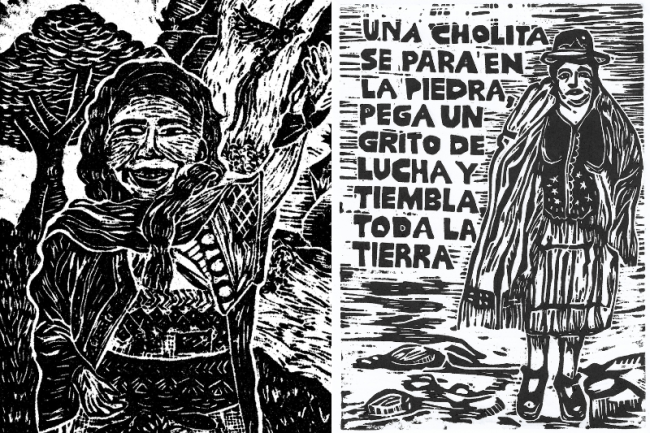
In 2008, Feministas del Abya Yala didn’t exist, but we did have a network of feminist collectives that we called Feministas Inconvenientes. This network was the result of the coming together of different autonomous feminist collectives born in the Argentine revolt of 2001. The slogan “Que se vayan todos” (out with them all) particularly affected us feminists, strengthening the idea that feminist movements had to be part of these popular revolts and rebellions.
Then we found ourselves in the fight for abortion, which was gaining momentum. At the 2008 Encuentro in Neuquén, Feministas Inconvenientes invited Colombian senator Piedad Córdoba, who was one of the architects of the struggle for peace in Colombia at a time when that seemed very distant and difficult. We knew that achieving peace was a crucial issue for women, and this included the idea of not giving birth to sons and daughters for war. Piedad came; she was the only Latin American compañera we invited at that time. Her contribution was very important, and we inaugurated this process of proposing a dialogue beyond national borders.
The following year was the coup d’état in Honduras, and it seemed very important to us to have the presence of Feministas en Resistencia. They put forward the slogan “Ni golpe de estado, ni golpe a las mujeres” (no coup d’état, no blow to women). We invited a compañera from Feministas en Resistancia of Honduras to the 2009 Encuentro in Tucumán. Other Latin American compañeras who were interested in being part of those gatherings, which were already very massive and multitudinous, started to spontaneously join. This is how, year after year within the Encuentro, we continue holding what we called the Assembly of Feminists in Resistance, taking up the baton of our Honduran compañeras. Later it expanded to different themes. In recent years, we had very large presences at the Encuentros in Resistencia [in 2017], in Trelew [in 2018], and in La Plata [in 2019].
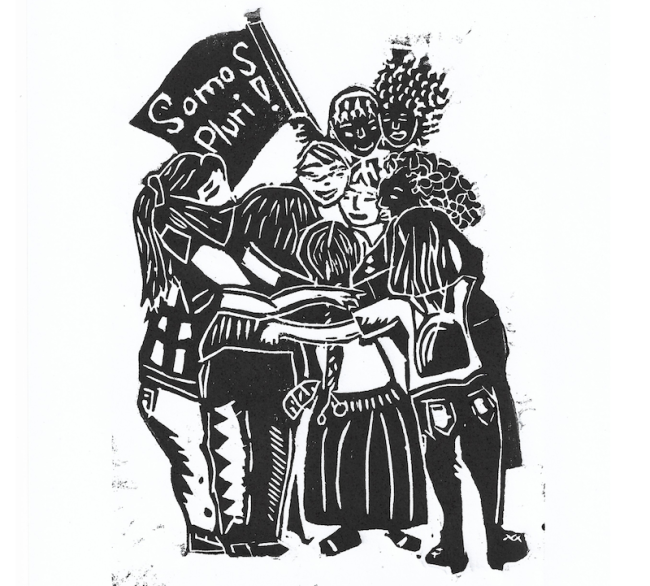
Last year, in Bariloche, there was a very important presence of women from Indigenous communities that defend land and territory, and of antipatriarchal communitarian feminists from different pueblos. The presence of Mapuche sisters, who remain in an intense fight for their rights, was very important. Coming from experiences of communitarian feminisms, Lolita and Adriana were very important in giving the space an antipatriarchal, antiracist, anticolonial, and anticapitalist tone as a Plurinational Assembly that ended up impacting the Encuentro on a broader level. I believe that the Encuentro’s name change had a lot to do with the impact of these sisters.
Romina Green Rioja: Lolita and Adriana, how did you decide to participate in the Feministas del Abya Yala Assembly in 2019? What was your experience of being there and what did you learn?
Adriana Guzmán Arroyo: Participating in the Feministas del Abya Yala Assembly in 2019 was part of a path that we had already started—not only as Feministas del Abya Yala, but because of the need to respond to the problems in the region and to come together across borders around the problems in each territory, the changes in governments and states, and the internal discussions among feminists. We must decolonize feminisms and the racist logics within feminisms that are meant to attack us.
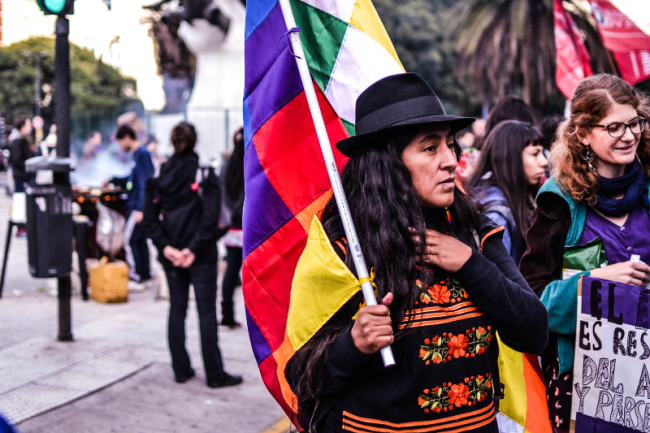
We found ourselves in [the assembly] with other sisters who were thinking the same thing. We were talking about feminisms that were insufficient for what we wanted to do, which was to denounce transnational corporations, extractivism, attacks on our territories, trafficking networks, and femicides as logics of domination linked to colonial, racist, capitalist patriarchy. We began to have those discussions at the 2017 Encuentro in Resistencia, in the province of Chaco. There were many Qom, Wichí, and Mapuche sisters who began to talk about plurinationality and about their presence in the Encuentros, which had not been made visible by feminists who assume that there is only one way to do feminism.
From that moment, we entered the discussion because the context demanded it, and because the feminisms that existed up to that time were not enough. With Feministas del Abya Yala, we have been seeking out those of us who are in alignment. We have also been coming together in political trust in the face of the persecution against Lolita, and in the face of debates and an internal rupture within communitarian feminism in relation to violence. In 2019, we gathered with conviction around the need to raise the plurinational issue.
Read this rest of this interview, freely available for a limited time.
Romina Green Rioja is an assistant professor in Latin American history at Washington and Lee University in Virginia. She researches racial formation in 19th-century Chile and the modern-day feminist movement in Argentina and Chile. Her forthcoming book under contract with the University of Alabama Press is preliminarily titled ‘To Govern is to Educate:’ Modeling Racial Education in Modern Chile.
Nayla Luz Vacarezza is an associate researcher at the National Scientific and Technical Research Council (CONICET) in Argentina. She teaches feminist theory and gender studies at the University of Buenos Aires. Her latest book, coedited with Barbara Sutton, is Abortion and Democracy: Contentious Body Politics in Argentina, Chile, and Uruguay (Routledge, 2021).

